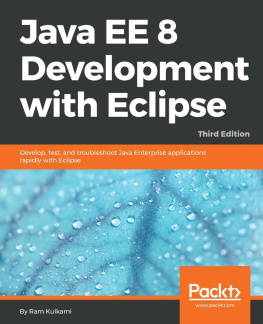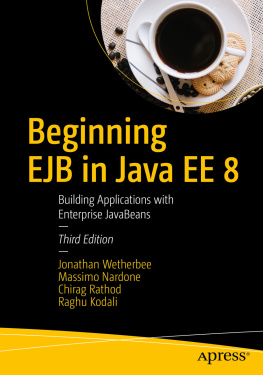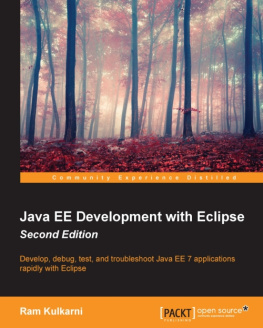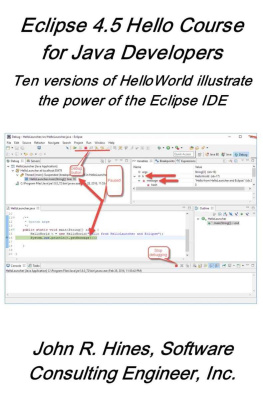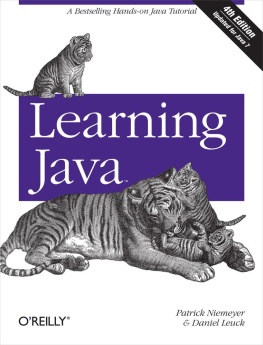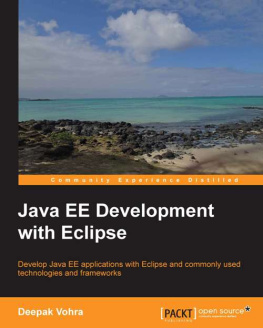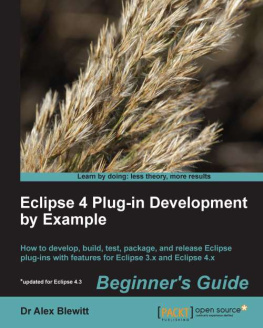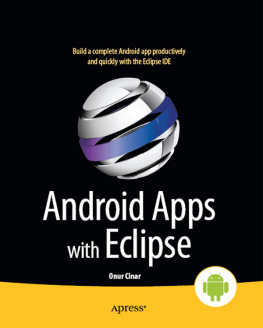Vinicius H. S. Durelli
Rafael M. Teixeira
Sharvari H. Baet
Tejal R. Soni
About the Authors
Rodrigo Fraxino Araujo is a Ph.D. candidate in Computer Science at the University of So Paulo, Brazil. He has spent a year as a visiting scholar at the Institut National de Recherche en Informatique et Automatique, Rocquencourt, France. He is also a software engineer and since 2011, is working at IBM.
I would specially like to thank Carolina, who gave me the strength to work on this book.
Vinicius H. S. Durelli is a Ph.D. candidate in Computer Science at the University of So Paulo, Brazil. As part of his doctoral studies, from 2011 to 2012, he was a visiting scholar at the George Mason University, Virginia, USA. He received his M.S. in Computer Science from the Federal University of So Carlos in 2008. He has been a Sun Certified Java Programmer since 2006. Also, he has been using Eclipse since circa 2004, which makes him feel old. When he is not writing or programming, Vinicius enjoys playing video games (especially Mario and Zelda games) and practicing Brazilian Jiu Jitsu.
I would like to express my deepest gratitude to my friend Simone Borges for placing food in front of me in order to keep me going while I was trying to hit deadlines related to this book and my ongoing Ph.D. studies.
Rafael M. Teixeira currently works as a Software Engineer at IBM Linux Technology Center, developing code for Eclipse open source projects. He's currently taking a MSc program in University of So Paulo, where he also received his Computer Engineering degree. Rafael's favorite hobby is running, but also enjoys some occasional video gaming.
I would like to thank my family for their caring and support, which made everything possible. I would also like to thank Bianca Teixeira, whose motivating and sweet words have kept me going for the last 7 years and will hopefully do so for many others. I dedicate this work to the memory of Luis Fernando Teixeira.
About the Reviewers
Francisco Osorio Glvez is a senior developer and technical leader working at Citigroup, and previously at IBM. He works designing, developing, and leading large Java enterprise systems for the banking industry. He enjoys working on different technologies just for fun. You can contact him at <>.
I would like to thank my wife Fabiola for the time I stole from her. Weekends were sacrificed in the review of this book. I'll make it up to you, I promise. ;)
Peter Rice is Professor Emeritus of Mathematics from the University of Georgia, USA. He began a career in the IT industry after retirement, which led him to becoming a certified Microsoft trainer, an IBM trainer, and to do extensive work as an independent trainer working from his own company, PM Rice Consulting, Inc. In addition, he has created and worked as principal architect on a number of commercial programs. He also works in a number of languages.
www.PacktPub.com
Support files, eBooks, discount offers and more
You might want to visit www.PacktPub.com for support files and downloads related to your book.
Did you know that Packt offers eBook versions of every book published, with PDF and ePub files available? You can upgrade to the eBook version at > for more details.
At www.PacktPub.com, you can also read a collection of free technical articles, sign up for a range of free newsletters and receive exclusive discounts and offers on Packt books and eBooks.
http://PacktLib.PacktPub.com
Do you need instant solutions to your IT questions? PacktLib is Packt's online digital book library. Here, you can access, read and search across Packt's entire library of books.
Why Subscribe?
- Fully searchable across every book published by Packt
- Copy and paste, print and bookmark content
- On demand and accessible via web browser
Free Access for Packt account holders
If you have an account with Packt at www.PacktPub.com, you can use this to access PacktLib today and view nine entirely free books. Simply use your login credentials for immediate access.
Preface
The first version of Eclipse was released in the November of 2001. Since then, it has come a long way in terms of enhancements and number of users. Due to the many improvements it has undergone, over time Eclipse has become popular and received a great deal of praise. Nowadays, Eclipse is arguably the most widely used integrated development environment (IDE) for developing Java applications. It is free and open source, and is shipped with plugins for performing lots of software-development-related activities. In addition, more plugins can be easily downloaded and installed according to your personal needs and preferences. Another plus is that, since Eclipse is written mostly in Java, it is cross-platform.
If you have been using Java without the help of an IDE, you must have realized by now that Java can be rough and unnerving at times. Most of the time, the compiler (javac) does not display helpful error messages. Even something as simple as an omitted semicolon may cause it to display a lengthy list of error messages. Inside an IDE, this sort of problem can be spotted before you try to run the program. An IDE can even suggest solutions before you start scratching your head. Undoubtedly, using a full-fledged IDE provides a range of benefits. For instance, an IDE provides autocompletion of your code, it helps you to format your code properly, and some of them come with nifty plugins for testing, debugging, and keeping track of the changes that you make to your code.

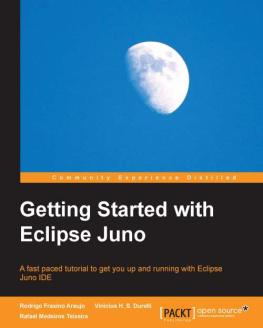
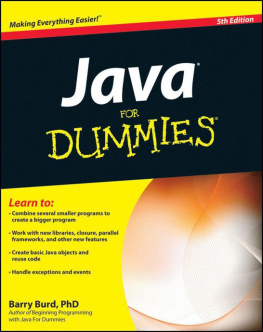
![Ram Kulkarni [Ram Kulkarni] - Java EE 8 Development with Eclipse](/uploads/posts/book/119355/thumbs/ram-kulkarni-ram-kulkarni-java-ee-8-development.jpg)
